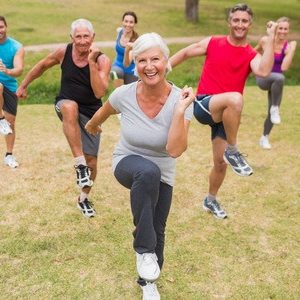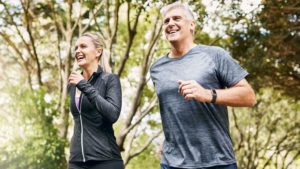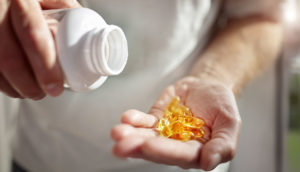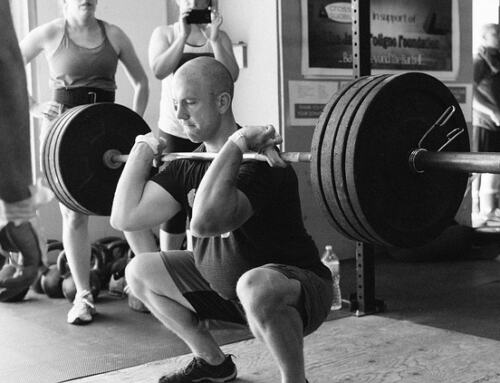Metabolism and Age: Why Does It Change After 50?
You’ve likely heard time and again that your metabolism changes as you get older, especially during your menopausal years. But what is metabolism exactly, and why is it affected by our age?
Simply put, metabolism is the chemical process by which your body converts the food you eat and the liquids you drink into energy. The calories from food and beverages mix with oxygen to release energy throughout your body, in order to keep it functioning properly. Of course, you need energy for physical exertion, but your body also needs energy when you’re resting. The energy provided during rest helps your body with functions like hormone level adjustment, breathing, blood circulation and new cell growth.
The number of calories your body uses to complete these functions is your basal metabolic rate, also known as your metabolism, according to the Mayo Clinic. Your body size and composition, gender, and age all affect your personal metabolic rate.
Metabolism and Age
In addition to the natural effects of aging, your level of activity can impact your metabolism. As you’ve gotten older, you may have found that you have less energy than you did when you were younger, which is natural. You may also suffer from conditions such as making moving around more challenging. Because of that, you might be exercising less, which means your body isn’t using up as many calories.
Women’s metabolisms are particularly affected during and after menopause because your estrogen levels drop. This can lower your metabolic rate and lead to weight gain.
What Can You Do?
Just because your metabolism changes after the age of 50, it doesn’t mean that you should just give up. One of the biggest
effects of this change is weight gain, but with these tips, you can help care for your body, regardless of your age.
Stay active: The key to staying active through every phase of life is to find an activity you actually enjoy. Whether it’s walking in the park, jogging, water aerobics, lifting weights, or dance fitness classes, participating in a fitness format you love makes it seem like less of a chore. It also increases the likelihood that you’ll stick with it. Aim to move at least two to three times a week, if you’re just starting out.
Change your diet: As noted, your body needs fewer calories to function properly after age 50. If you continue to eat as you did when you’re younger, your body will store those extra calories as fat. Now is the perfect time to look at what you’ve been eating and make some changes. Start reading labels to see what has added sugar, and try to limit those items. Eat more whole foods by shopping the outer perimeter of the store or the fresh produce area only. Stock up on plenty of fruits, vegetables, and lean proteins.
Take a well-researched supplement: Dr. Charles Brenner, a Stanford-
educated PhD specializing in cancer biology, discovered that nicotinamide riboside (NR), a form of vitamin B3, helps cells boost levels of a coenzyme called NAD+. NAD+ is essential for cells to convert carbs, fats and proteins into energy. It also helps cells regulate the natural effects of aging. Although NAD+ is naturally occurring, it substantially decreases with age.
[…]
Click here to view original web page at www.livingbetter50.com



 effects of this change is weight gain, but with these tips, you can help care for your body, regardless of your age.
effects of this change is weight gain, but with these tips, you can help care for your body, regardless of your age. Change your diet: As noted, your body needs fewer calories to function properly after age 50. If you continue to eat as you did when you’re younger, your body will store those extra calories as fat. Now is the perfect time to look at what you’ve been eating and make some changes. Start reading labels to see what has added sugar, and try to limit those items. Eat more whole foods by shopping the outer perimeter of the store or the fresh produce area only. Stock up on plenty of fruits, vegetables, and lean proteins.
Change your diet: As noted, your body needs fewer calories to function properly after age 50. If you continue to eat as you did when you’re younger, your body will store those extra calories as fat. Now is the perfect time to look at what you’ve been eating and make some changes. Start reading labels to see what has added sugar, and try to limit those items. Eat more whole foods by shopping the outer perimeter of the store or the fresh produce area only. Stock up on plenty of fruits, vegetables, and lean proteins. educated PhD specializing in cancer biology, discovered that nicotinamide riboside (NR), a form of vitamin B3, helps cells boost levels of a coenzyme called NAD+. NAD+ is essential for cells to convert carbs, fats and proteins into energy. It also helps cells regulate the natural effects of aging. Although NAD+ is naturally occurring, it substantially decreases with age.
educated PhD specializing in cancer biology, discovered that nicotinamide riboside (NR), a form of vitamin B3, helps cells boost levels of a coenzyme called NAD+. NAD+ is essential for cells to convert carbs, fats and proteins into energy. It also helps cells regulate the natural effects of aging. Although NAD+ is naturally occurring, it substantially decreases with age.




